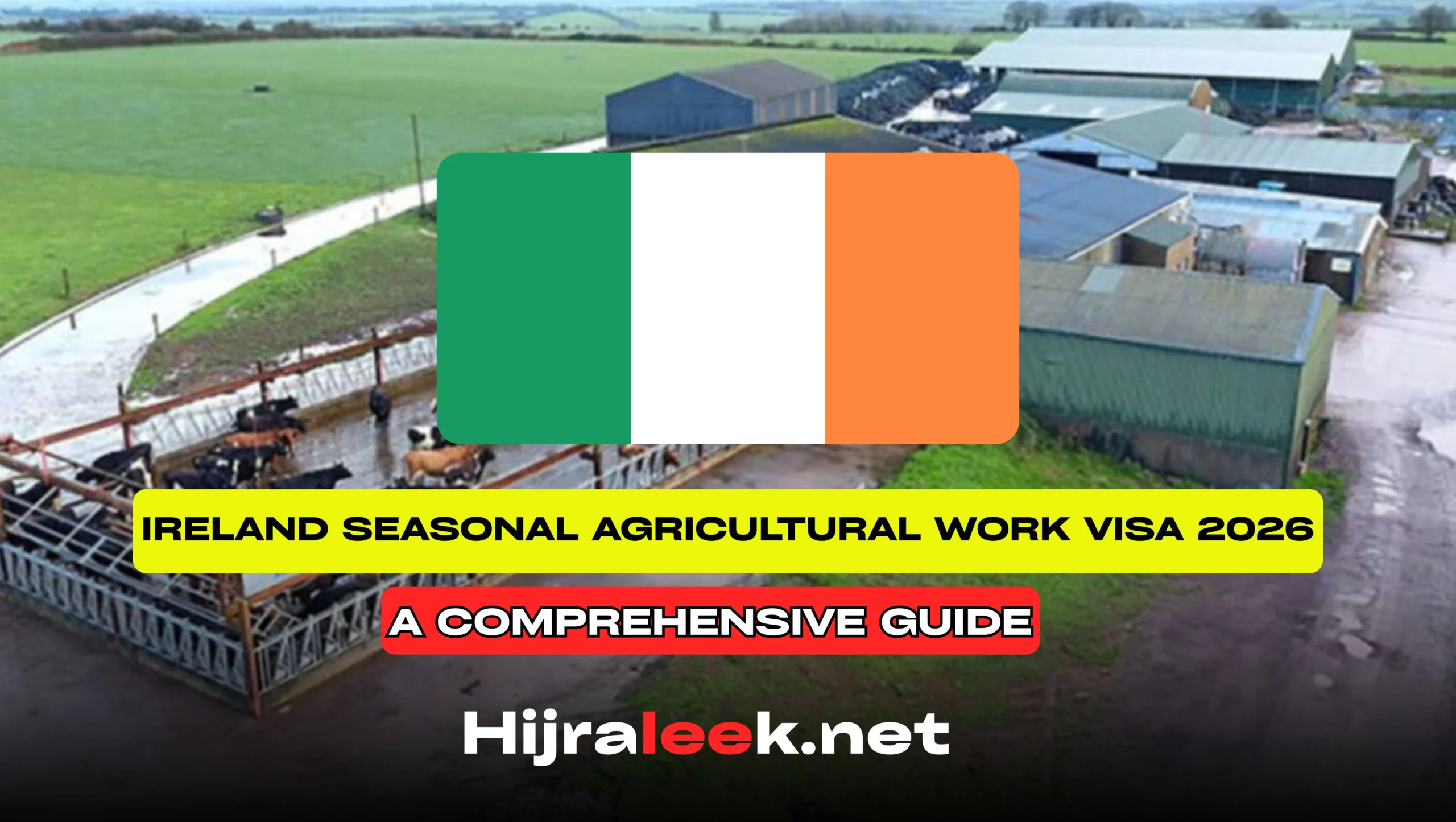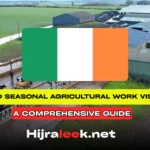The Ireland Seasonal Agricultural Work Visa 2026, officially known as the Seasonal Employment Permit (SEP), offers non-EU/EEA nationals a unique opportunity to work in Ireland’s thriving agricultural sector, renowned for its dairy, meat, and vegetable production. As part of a pilot program launched in 2024 and expected to expand in 2026, this visa allows workers to engage in seasonal roles for up to 7 months, particularly in regions like Cork, Galway, and Wexford. This 2000-word guide, optimized for the keyword Ireland Seasonal Agricultural Work Visa, details eligibility, required documents, application steps, costs, salaries, benefits, challenges, and FAQs to help you secure agricultural jobs in Ireland for 2026. Platforms like Hijraleek connect workers with verified Irish employers, simplifying the job search process.
Introduction to the Ireland Seasonal Agricultural Work Visa 2026
Ireland’s agricultural sector contributes approximately €7 billion annually to exports, with strengths in dairy (e.g., butter, cheese), beef, and crops like potatoes and soft fruits. The Ireland Seasonal Agricultural Work Visa (SEP) addresses labor shortages in seasonal farming, enabling non-EU/EEA workers to fill roles such as fruit picking, vegetable harvesting, and livestock care. Introduced as a pilot to meet the needs of Ireland’s 38,000 farms, the SEP is expected to offer over 5,000 permits in 2026, driven by demand during peak seasons (June–October). Administered by the Department of Enterprise, Trade and Employment (DETE) and the Irish Naturalisation and Immigration Service (INIS), this visa ensures fair wages (minimum €12.70/hour in 2025, likely increasing in 2026) and worker protections, making Ireland an attractive destination for seasonal workers.
Why Ireland Needs Seasonal Agricultural Workers in 2026
Ireland faces a persistent shortage of agricultural labor, with up to 10,000 seasonal jobs unfilled annually due to an aging workforce and urban migration. In 2026, factors like Ireland’s commitment to sustainable farming under the EU’s Farm to Fork Strategy and increased export demand will amplify the need for workers in fruit orchards, dairy farms, and vegetable fields. Regions like Cork (dairy), Wexford (berries), and Galway (mixed farming) rely heavily on international labor to meet production targets. The SEP program, expanded for 2026, aims to streamline recruitment while ensuring ethical treatment, aligning with Ireland’s goal of a 15% increase in agricultural output by 2030.
Portugal Seasonal Agricultural Visa 2026: Step-by-Step Process
Who Can Apply for the Ireland Seasonal Agricultural Work Visa?
The Ireland Seasonal Agricultural Work Visa is designed for non-EU/EEA and non-Swiss nationals, as EU/EEA/Swiss citizens have free movement and work rights in Ireland. Key eligibility criteria include:
- Nationality: Open to third-country nationals (e.g., India, Brazil, Philippines, Nigeria) without EU residency.
- Age: Minimum 18 years; employers may prefer candidates under 55 for physically demanding roles.
- Job Offer: A signed contract from an “Approved Seasonal Employer” registered with DETE.
- Health and Character: Clean criminal record and good health; no serious communicable diseases.
- No Formal Qualifications: Most seasonal roles (e.g., harvesting, packing) require no education, though farming experience is a plus.
Types of Ireland Seasonal Agricultural Work Visas 2026
Ireland offers specific visa schemes for seasonal agricultural work, with the SEP being the primary option.
Seasonal Employment Permit (SEP)
- Purpose: For repetitive seasonal jobs in agriculture, such as fruit/vegetable harvesting and livestock care.
- Duration: 3–7 months per calendar year; workers must leave Ireland for 5 months before reapplying.
- Key Features: Requires an approved employer; permits transfer between approved employers without a new permit. Covers roles like berry picking, dairy farming, and greenhouse work.
- Sectors: Agriculture, horticulture, and related fields.
General Employment Permit
- Purpose: For non-seasonal or skilled agricultural roles (e.g., farm managers, agricultural technicians).
- Duration: Up to 2 years, renewable.
- Key Features: Requires a Labour Market Needs Test (LMNT) and a minimum salary of €30,000/year.
For short-term stays (up to 90 days), a Short-Stay (C) Visa may suffice, but the SEP is standard for seasonal agriculture.
Denmark Seasonal Worker Visa 2026: Agriculture Jobs Guide
Eligibility Requirements for Ireland Seasonal Agricultural Work Visa 2026
To qualify for the Ireland Seasonal Agricultural Work Visa, applicants must meet specific criteria aligned with Irish labor regulations.
Age and Health Conditions
- Age: At least 18 years; physical fitness is essential for tasks like harvesting or livestock handling, often requiring 8-hour shifts.
- Health: A medical certificate is required for stays over 6 months or roles involving food/livestock safety (e.g., dairy processing). Tuberculosis screening may apply for certain nationalities, conducted by DETE-approved physicians.
Education and Skills Needed
- Education: No formal education required for low-skill roles (e.g., fruit pickers, farmhands; NOC equivalent 85103).
- Skills: Prior experience in agriculture (e.g., planting, harvesting, machinery operation) is advantageous but not mandatory. Training is typically provided on-site.
Language Requirements
- Language Skills: No formal language test required (e.g., IELTS). Basic English proficiency is sufficient, as English is Ireland’s primary language. Some employers may prefer basic Irish (Gaelic), but it’s rare.
Documents Required for Application
A complete application minimizes delays. All non-English documents must be translated and apostilled.
Valid Passport and Photos
- Passport: Valid for at least 6 months beyond the intended stay, with 2 blank pages. Include copies of the photo page.
- Photos: Two recent biometric passport-sized photos (35mm x 45mm, white background).
Job Offer from an Irish Employer
- Employment Contract: Signed contract detailing the job role (e.g., strawberry picker), location, hours (up to 39/week), salary (minimum €12.70/hour), duration, and benefits (e.g., housing). The employer must be an Approved Seasonal Employer with DETE approval.
- Labour Market Needs Test (LMNT): Proof that no EU/EEA workers are available, submitted by the employer.
Medical Exam and Police Certificate
- Medical Exam: Certificate from an approved doctor (€150–€300), confirming no public health risks.
- Police Certificate: Criminal record check from your home country and any country of residence for over 6 months in the past 5 years (€20–€100, apostilled if required).
Additional: Proof of accommodation (employer-provided or rental), travel insurance (€30,000 coverage), and a flight itinerary.
Step-by-Step Application Process
The Ireland Seasonal Agricultural Work Visa 2026 application process takes 8–12 weeks. Start in late 2025 for spring/summer 2026 jobs.
How to Find an Agricultural Job in Ireland 2026
- Job Platforms: Use Hijraleek, Jobindex.ie, EURES, or AgriCareers to find visa-sponsored farm jobs.
- Recruitment Agencies: Contact DETE-approved agencies like FRS Recruitment or AgriRecruit for placements in Cork, Wexford, or Galway.
- Apply: Submit a CV highlighting any farming experience; interviews are often virtual or phone-based.
- Secure Offer: Negotiate contract terms; the employer handles DETE approval as an Approved Seasonal Employer.
Peak seasons: June–October (fruits/vegetables), November–February (dairy/livestock).
Online Visa Application Process
- Employer Submits Approval: Employer applies to DETE for SEP approval, including LMNT (5–10 days).
- Gather Documents: Compile passport, photos, contract, medical/police certificates, and insurance.
- Book Appointment: Schedule at an Irish embassy, consulate, or VFS Global via www.dfa.ie.
- Complete Form: Fill out the AVATS online application for a Long-Stay (D) Visa or SEP form via employmentpermits.dbei.ie.
- Submit Application: Attend the appointment for biometrics (€85 fee); pay visa fee (€300) via card or bank transfer.
- Track Status: Use the AVATS reference number or VFS portal to monitor progress.
Processing Time and Approval
- Processing Time: 8–12 weeks; agricultural permits are prioritized under SEP quotas.
- Approval: Receive a visa sticker and work permit. Upon arrival, register with INIS within 90 days for an Irish Residence Permit (IRP) if staying over 90 days.
Cost of Applying for Ireland Seasonal Agricultural Work Visa 2026
Government Fees
- SEP Fee: €1,000, paid by the employer.
- Visa Fee: €300 for Long-Stay (D) Visa; free for certain nationalities (e.g., Brazil under bilateral agreements).
- Biometrics: €85, included in visa processing.
Other Expenses
- Medical Exam: €150–€300.
- Police Certificate: €20–€100.
- Travel: Flights €400–€800 (e.g., from Asia or South America); some employers reimburse.
- Insurance: €100–€200 for initial coverage until public healthcare applies (free with IRP).
Total estimated cost: €500–€800, often offset by employer support or first paycheck.
Salary and Benefits for Agricultural Workers in Ireland 2026
Average Farm Worker Salary in Ireland
- Low-Skill Roles: €12.70–€15/hour (e.g., fruit pickers, farmhands); monthly €2,000–€2,500 (39-hour weeks).
- Skilled Roles: €18–€22/hour (e.g., farm supervisors); monthly €3,000–€3,800.
- Minimum Wage (2026): Expected at €13–€13.50/hour, with collective agreements ensuring higher agricultural pay.
Housing, Food, and Transportation Support
- Housing: Employer-provided, free or subsidized (€30/week maximum deduction).
- Food: Often included or subsidized (€5–€10/day).
- Transportation: Employers provide shuttles to worksites; some cover airport transfers for long-term contracts.
Additional benefits: 20 days paid holiday (pro-rata), social security, and access to Ireland’s public healthcare system post-registration.
Challenges and Tips for Success
Common Challenges
- Limited Quotas: SEP may cap at 5,000 permits annually; early application is critical.
- Processing Delays: Peak season backlogs can extend to 12 weeks.
- Language Barriers: While English is sufficient, rural settings may isolate non-English speakers.
- Physical Demands: Harvesting and livestock tasks require stamina in varying weather.
Tips for Fast Visa Approval
- Apply Early: Start job searches in late 2025 via Hijraleek or EURES for June–October 2026 roles.
- Verify Employer: Ensure the employer is DETE-approved as an “Approved Seasonal Employer.”
- Complete Documents: Apostille and translate documents early to avoid rejections.
- Learn Basic English: Free online courses (e.g., Duolingo) improve communication.
- Track Application: Monitor status via www.dfa.ie or VFS Global.
Useful Resources and Official Links
Department of Enterprise, Trade and Employment (DETE)
- DETE Employment Permits: Official site for SEP applications, forms, and employer requirements.
Irish Naturalisation and Immigration Service (INIS)
- INIS: Visa and residence permit information for non-EU workers.
Job Platforms for Agricultural Work
- Hijraleek: Connects workers with verified Irish farm employers.
- workleek.net: Lists agricultural jobs with visa sponsorship.
- EURES: European job portal with Irish listings.
- AgriCareers: Specialized recruitment for agricultural roles.
Conclusion
The Ireland Seasonal Agricultural Work Visa 2026 opens doors to rewarding work in Ireland’s lush farmlands, offering competitive wages, employer support, and a chance to experience the country’s rich culture. By securing a job offer through platforms like Hijraleek, preparing complete documentation, and applying via DETE or VFS Global, you can successfully join Ireland’s agricultural sector. With streamlined processes and strong worker protections, 2026 is an ideal year to contribute to Ireland’s green economy.




















